What Is Required on a Personal Watercraft? Essential Gear, Safety Rules, and Legal Must-Haves
Riding a personal watercraft (PWC) like a Jet Ski, WaveRunner, or Sea-Doo can be one of the most thrilling ways to enjoy the water. But before you hit the throttle, it’s crucial to know what is required on a personal watercraft to stay safe, follow the law, and avoid costly fines. From essential safety gear to legal must-haves, this guide will walk you through everything you need before launching.
1. U.S. Coast Guard-Approved Life Jacket
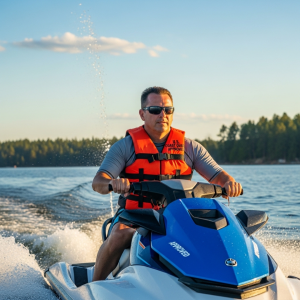
The most important requirement for operating a PWC is wearing a properly fitted, U.S. Coast Guard-approved personal flotation device (PFD). This isn’t just a recommendation, it’s mandatory in most states.
- The life jacket must be a Type III or V PFD designed for high-impact activities.
- It must fit snugly and be in good condition without tears or broken straps.
- Every person onboard, including passengers, must wear one at all times.
2. Safety Lanyard (Engine Cut-Off Switch)
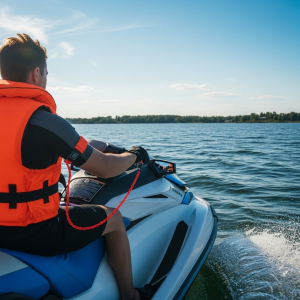
Most PWCs are equipped with a kill switch lanyard that attaches to the operator’s wrist or life jacket. If you fall off, the lanyard immediately stops the engine, preventing the craft from circling back dangerously or colliding with others.
- In many places, using the safety lanyard is legally required.
- Some newer models have wireless engine cut-off systems for added convenience.
3. Visual Distress Signals
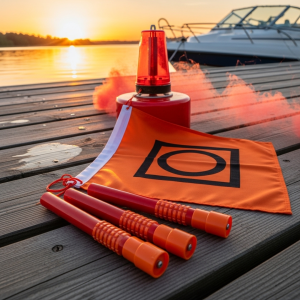
If you’re operating on coastal waters, the Great Lakes, or certain rivers, you may be required to carry daytime and nighttime visual distress signals such as flares or an orange distress flag.
- Requirements vary by state, so check your local boating laws.
- Even if not mandatory, having a simple distress flag can make a big difference in emergencies.
4. Sound-Producing Device
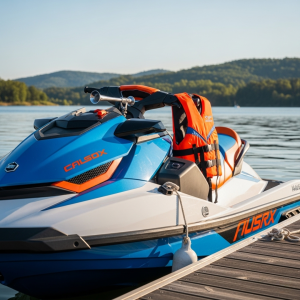
A whistle or air horn is required on most PWCs. This allows you to alert other boaters if they are approaching too closely or if you’re in trouble.
- Many life jackets come with a built-in whistle for easy access.
5. Fire Extinguisher
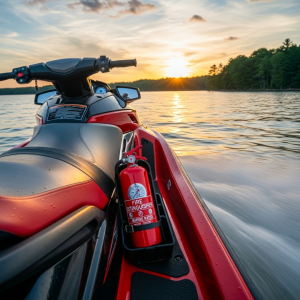
Most jurisdictions require a marine-rated fire extinguisher onboard. Even though PWCs are small, they still have fuel systems that could ignite in rare cases.
- Make sure it’s fully charged and stored in an accessible location.
6. Registration and Documentation
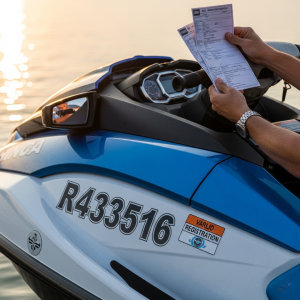
Just like cars, PWCs need to be registered in most states. You should carry:
- Valid registration documents onboard.
- State-issued registration numbers and decals displayed on the hull as required.
Operating without proper documentation can result in hefty fines.
7. Navigation Lights (if operating at night)
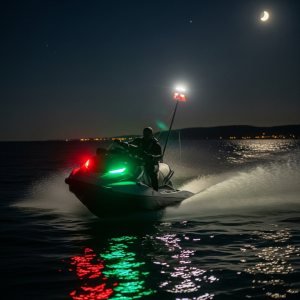
While most PWC activity happens in daylight, if you plan to ride after sunset, you must follow navigation light requirements for your state.
- Some areas prohibit nighttime operation of PWCs entirely to check your local rules.
8. State-Specific Safety Equipment

Every state has its own boating safety laws. Some common additional requirements include:
- Boater education card or license for operators, especially those under a certain age.
- Minimum age restrictions (often 16 years old to operate alone).
- No-wake zone compliance to protect swimmers and shoreline areas.
9. Recommended but Not Always Required Items
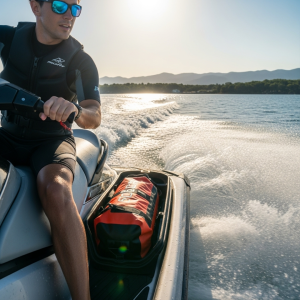
While not legally required everywhere, these items improve safety:
- Sunglasses and sunscreen to protect against glare and UV rays.
- Dry bag with your phone, first aid kit, and water.
- Protective wetsuit shorts to prevent injury from jet thrust.
Final Thoughts
Understanding what is required on a personal watercraft is more than just following the law it’s about ensuring your safety and the safety of everyone on the water. Before launching, do a quick gear check: life jacket, safety lanyard, whistle, fire extinguisher, registration, and any state-specific items.
By being prepared, you’ll not only avoid fines but also enjoy a stress-free, exhilarating ride on the water. Always remember: Safety first, adventure second because the best rides are the ones you come back from safely. For reliable marine gear and expert boating tips, trust Dockstop to keep your personal watercraft adventures safe and unforgettable.
